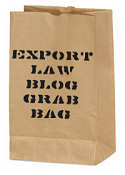![DSCN7029 by Bianca Ruiz [CC-BY-SA-2.0 (http://creativecommons.org/licenses/by-sa/2.0)], via Flickr https://flic.kr/p/pZgJCd [cropped] DSCN7029 by Bianca Ruiz [CC-BY-SA-2.0 (http://creativecommons.org/licenses/by-sa/2.0)], via Flickr https://flic.kr/p/pZgJCd [cropped]](https://www.exportlawblog.com/images/books.jpg) Last week, the Office of Foreign Assets Control (“OFAC”) issued guidance which expands the scope of the various general licenses, embodied in its rules, relating to publishing activities with nationals of sanctioned countries. OFAC has always taken the dubious position that editing and formatting for publication documents prepared by individuals in sanctioned countries was not covered by the informational materials exemption in the Berman Amendment. Instead, according to OFAC, it was a provision of a service to the sanctioned country and required a license. In its most questionable incarnation, OFAC, for a period of time, insisted that publication of anything other than “camera-ready” copy of materials authored by an individual in a sanctioned country required an OFAC license. Why OFAC did not carry this nonsensical logic to its final extreme and say that picking a book from a warehouse shelf before exporting it to a sanctioned country was also a “service” requiring a license has always been unclear.
Last week, the Office of Foreign Assets Control (“OFAC”) issued guidance which expands the scope of the various general licenses, embodied in its rules, relating to publishing activities with nationals of sanctioned countries. OFAC has always taken the dubious position that editing and formatting for publication documents prepared by individuals in sanctioned countries was not covered by the informational materials exemption in the Berman Amendment. Instead, according to OFAC, it was a provision of a service to the sanctioned country and required a license. In its most questionable incarnation, OFAC, for a period of time, insisted that publication of anything other than “camera-ready” copy of materials authored by an individual in a sanctioned country required an OFAC license. Why OFAC did not carry this nonsensical logic to its final extreme and say that picking a book from a warehouse shelf before exporting it to a sanctioned country was also a “service” requiring a license has always been unclear.
After years of newspapers openly defying these rules publishing stories from Iranian (and other) dissidents in versions that the newspapers typeset instead of the typewritten copy sent by the dissidents, OFAC ultimately in 2004 amended the rules to add a general license permitting certain editing, translation, formatting and typesetting activities by publishers. Each of these rules, however, provided that these activities could not be performed on behalf of sanctioned governments or their officials.
The new guidance states what should have been more or less obvious: that the prohibition did not cover written materials authored by government officials in their personal capacity. But OFAC appears not to have been able to resist the opportunity to take back more than it gave, noting that it was up to the publisher to decide in what capacity the government official was writing and, worse, that it would not provide any guidance by issuing specific licenses in difficult cases.
Indeed, it is the policy of OFAC not to grant applications for specific licenses
authorizing transactions to which the provisions of an outstanding general license are applicable.
And even though OFAC says that it won’t offer help on determining the government official’s capacity, it does not provide any safe harbor for a publisher that makes a good faith mistake. Nope. Any such mistake would lead to significant civil penalties, currently maxed out at $284,582 per violation.
Oh, you reply, why not just apply for licenses anyway in questionable cases? You can provide all the information relating to the capacity in which the government official is writing; and then, when OFAC returns or denies the application, you will have your answer. That assumes, of course, that OFAC will return such an application rather than just file it away in an archive for the next century or so.
Is anyone else offended by an agency saying, as it seems to have done here, that you must abide by our rules but we refuse to provide any guidance on the proper interpretation of our rules?
Photo Credit: DSCN7029 by Bianca Ruiz [CC-BY-SA-2.0 (http://creativecommons.org/licenses/by-sa/2.0)], via Flickr https://flic.kr/p/pZgJCd [cropped]. Copyright 2015 Bianca Ruiz
![The Hill Front Page via https://www.facebook.com/TheHill/photos/a.445406209086.230191.7533944086/10150235234964087/?type=1&theater [Fair Use] The Hill Front Page via https://www.facebook.com/TheHill/photos/a.445406209086.230191.7533944086/10150235234964087/?type=1&theater [Fair Use]](https://www.exportlawblog.com/images/thehill.jpg)

 Posted by
Posted by  Category:
Category: 

 Here are a few recent developments that you may have missed:
Here are a few recent developments that you may have missed:![DSCN7029 by Bianca Ruiz [CC-BY-SA-2.0 (http://creativecommons.org/licenses/by-sa/2.0)], via Flickr https://flic.kr/p/pZgJCd [cropped] DSCN7029 by Bianca Ruiz [CC-BY-SA-2.0 (http://creativecommons.org/licenses/by-sa/2.0)], via Flickr https://flic.kr/p/pZgJCd [cropped]](https://www.exportlawblog.com/images/books.jpg)
![Kremlin.ru [CC-BY-3.0 (http://creativecommons.org/licenses/by/3.0)], via Wikimedia Commonshttp://commons.wikimedia.org/wiki/File%3AVladimir_Putin_at_the_Millennium_Summit_6-8_September_2000-19.jpg Kremlin.ru [CC-BY-3.0 (http://creativecommons.org/licenses/by/3.0)], via Wikimedia Commonshttp://commons.wikimedia.org/wiki/File%3AVladimir_Putin_at_the_Millennium_Summit_6-8_September_2000-19.jpg](https://www.exportlawblog.com/images/Putin.jpg) As the U.S. considers more sanctions on Russia, given its cybershenanigans and its involvement in Syria on behalf of Bashar al-Assad, it is running into some unexpected difficulties. The quote of the week, from
As the U.S. considers more sanctions on Russia, given its cybershenanigans and its involvement in Syria on behalf of Bashar al-Assad, it is running into some unexpected difficulties. The quote of the week, from ![Image via https://pixabay.com/p-1202440/?no_redirect [Public Domain] Image via https://pixabay.com/p-1202440/?no_redirect [Public Domain]](https://www.exportlawblog.com/images/cuba_cars.jpg)


